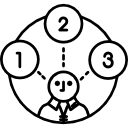Blockchain: Difference between revisions
Mr. MacKenty (talk | contribs) No edit summary |
Mr. MacKenty (talk | contribs) No edit summary |
||
| Line 39: | Line 39: | ||
* [[Transaction pool]] | * [[Transaction pool]] | ||
* [[Self-referential data structure]] | * [[Self-referential data structure]] | ||
* [[Non-invertibility]] | |||
=== Everything below this line is not yet completed for student learning === | === Everything below this line is not yet completed for student learning === | ||
| Line 45: | Line 46: | ||
* [[Distributed consensus]] | * [[Distributed consensus]] | ||
* [[Double-spend problem]] | * [[Double-spend problem]] | ||
* [[Non-repudiation]] | * [[Non-repudiation]] | ||
* [[Takeover attack]] | * [[Takeover attack]] | ||
Revision as of 16:34, 9 March 2020

A block chain is a growing list of records, called blocks, that are linked using cryptography. Each block contains a cryptographic hash of the previous block, a timestamp, and transaction data (generally represented as a Merkle tree).[2]
A blockchain is a decentralized, distributed, and oftentimes public, digital ledger that is used to record transactions across many computers so that any involved record cannot be altered retroactively, without the alteration of all subsequent blocks[3]
A ledger is a permanent summary of all amounts entered in supporting journals which list individual transactions by date.[4]
Videos[edit]
The video below is easily the best I have found explaining blockchain. I would suggest you watch it several times.
The video below is a very good high-level overview of blockchain:
Start here to understand blockchain[edit]
- Trust and Currency
- Hashing (related to this is cryptographic hash, collision resistance, determinism, one-way function and entropy).
- Digital signature (related to this is key pair generation and SHA256)
- Ledger
- Block (related to this is Block header and Candidate block)
- Mining (related to this is miner, nonce and proof of work)
Other ideas in blockchain[edit]
- Immutable transactions
- Merkle proof
- Merkle tree
- 51% attack
- Genesis block
- PuTTYgen
- Transaction pool
- Self-referential data structure
- Non-invertibility